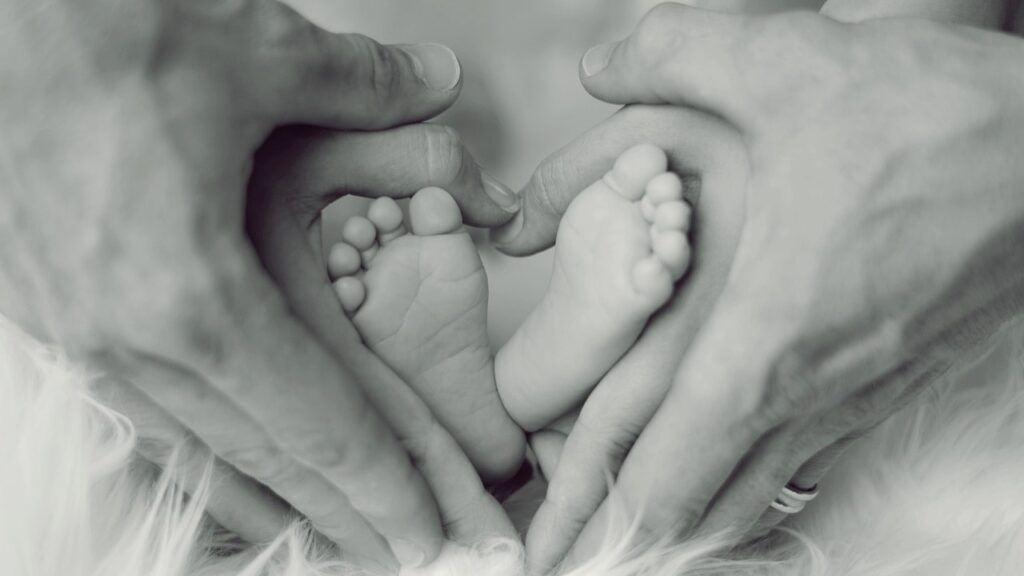Welcoming a newborn into your life is a joyful yet challenging experience. Understanding the initial steps of newborn care is essential to ensuring your baby’s health, comfort, and safety. From the first moments after birth to creating a nurturing environment, each step lays the foundation for your baby’s well-being.
This guide provides parents with practical tips and insights into newborn care basics, helping you confidently navigate these precious early days.
The First 5 Steps in Newborn Care: A Complete Guide

1. Prioritize Immediate Skin-to-Skin Contact
Skin-to-skin contact is one of the most crucial initial steps of newborn care. This practice strengthens the bond between parent and baby while promoting physical and emotional health.
- Benefits:
- Regulates baby’s body temperature.
- Stabilizes heart rate and breathing.
- Encourages breastfeeding by stimulating milk production.
- How to Practice:
- Hold your baby against your bare chest shortly after birth.
- Continue this practice during quiet times at home for comfort and bonding.
Establishing this connection early is one of the most meaningful steps in newborn care basics.
2. Cleanliness: Ensuring Hygiene for Your Newborn
Maintaining hygiene is a cornerstone of essential steps for baby care, protecting your baby from infections.
- Umbilical Cord Care: Keep the area dry and clean until it falls off naturally. Avoid covering it with tight diapers.
- Bathing Routine:
- Sponge bathe your baby until the umbilical cord stump heals.
- Use lukewarm water and mild, unscented baby soap.
- Hand Hygiene: Ensure everyone washes their hands before holding the baby.
By focusing on hygiene, you are taking one of the most important initial steps of newborn care to keep your baby safe and healthy.

3. Feeding: Meeting Nutritional Needs
Proper nutrition is vital for your baby’s growth and development. Whether breastfeeding or formula feeding, understanding feeding cues is part of the first steps in caring for a newborn.
- Breastfeeding: Aim to feed every 2-3 hours, ensuring your baby latches correctly. Breast milk provides essential nutrients and immunity.
- Formula Feeding: Follow your pediatrician’s recommendations and prepare bottles with sterilized equipment.
- Recognizing Hunger Signs:
- Rooting or sucking motions.
- Crying or fussiness.
Meeting your baby’s nutritional needs is an integral part of the initial steps of newborn care to support healthy growth.

4. Sleep and Safe Sleeping Practices
Sleep is essential for your baby’s development, and safe sleeping habits are integral to newborn care basics.
- Create a Sleep-Friendly Environment:
- Use a firm mattress in a crib or bassinet.
- Keep the sleeping area free from toys, blankets, and pillows.
- Follow the ABCs of Safe Sleep:
- Alone: Your baby should sleep without sharing a bed.
- Back: Always place your baby on their back to sleep.
- Crib: Ensure the baby sleeps in a safe crib or bassinet.
Implementing safe sleep practices is one of the most important initial steps of newborn care, ensuring your baby rests safely and comfortably.
5. Regular Health Checkups and Vaccinations
Health checkups are a critical part of the initial steps of newborn care, ensuring your baby’s health is monitored consistently.
- Schedule Pediatric Visits: Visit your pediatrician within the first week of birth and adhere to the recommended schedule.
- Vaccinations: Keep track of your baby’s vaccination schedule to protect against diseases.
- Monitor Health Signs: Contact your doctor if your baby shows signs of fever, unusual fussiness, or feeding difficulties.
By staying proactive with health checkups, you can address any concerns early and keep your baby healthy.
Conclusion
Caring for a newborn baby is a rewarding journey that begins with understanding the initial steps of newborn care. By prioritizing practices like skin-to-skin contact, maintaining hygiene, proper feeding, safe sleep habits, and regular health checkups, parents create a nurturing environment where their baby can grow and thrive.
Each step reinforces the bond between parent and child, offering a sense of security and love. For those deeply interested in providing the best for their newborn, these essential practices not only ensure health and happiness but also build the foundation for a lifetime of well-being and trust.
FAQ’s
What are the most important initial steps of newborn care?
The most important steps include skin-to-skin contact, maintaining hygiene, establishing a feeding routine, ensuring safe sleep practices, and scheduling regular health checkups.
How can I ensure my newborn stays clean?
Keep the umbilical cord area dry, sponge bathe until it heals, and maintain good hand hygiene for everyone handling the baby.
What should I know about safe sleep for my newborn?
Follow the ABCs of safe sleep: place your baby Alone, on their Back, in a Crib. Avoid loose bedding and soft toys in the crib.
How often should I feed my newborn?
Feed your newborn every 2-3 hours or when they show hunger cues, such as rooting or crying. Breast milk or formula should meet their nutritional needs.
Why are regular health checkups important for newborns?
Health checkups help monitor your baby’s growth, track vaccinations, and address any concerns early for optimal well-being.





Pingback: When Should I Stop Buying Newborn Clothes? Expert Insights December 5, 2024 2024
Pingback: Parenting with Love and Logic Book: A Modern Guide for Families 2024